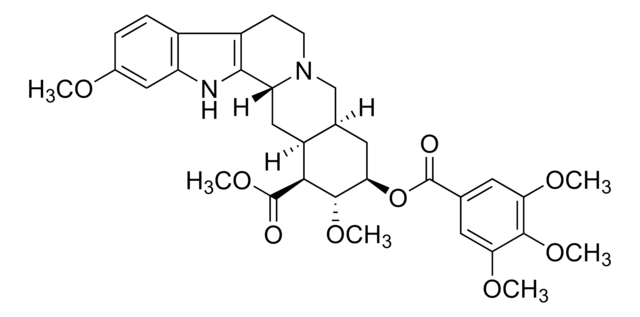46043
Ethidium homodimer
suitable for fluorescence, ~90% (HPCE)
Synonym(s):
EtDi, EthD-1
About This Item
Recommended Products
Assay
~90% (HPCE)
Quality Level
form
solid
mp
≥250 °C (lit.)
solubility
DMF: soluble
DMSO: soluble
H2O: soluble
fluorescence
λex 493 nm in H2O
λex 528 nm; λem 617 nm in TE buffer; DNA
suitability
suitable for fluorescence
storage temp.
−20°C
SMILES string
Cl.Cl.[Cl-].[Cl-].Nc1ccc2c(c1)c(-c3ccccc3)[n+](CCCNCCNCCC[n+]4c(-c5ccccc5)c6cc(N)ccc6c7ccc(N)cc47)c8cc(N)ccc28
InChI
1S/C46H46N8.4ClH/c47-33-13-17-37-39-19-15-35(49)29-43(39)53(45(41(37)27-33)31-9-3-1-4-10-31)25-7-21-51-23-24-52-22-8-26-54-44-30-36(50)16-20-40(44)38-18-14-34(48)28-42(38)46(54)32-11-5-2-6-12-32;;;;/h1-6,9-20,27-30,49-52H,7-8,21-26,47-48H2;4*1H
InChI key
ZKAJUKABUUJRLB-UHFFFAOYSA-N
Looking for similar products? Visit Product Comparison Guide
Application
Packaging
Other Notes
Signal Word
Danger
Hazard Statements
Precautionary Statements
Hazard Classifications
Carc. 2 - Eye Dam. 1 - Skin Corr. 1B - Water-react 3
Storage Class Code
4.3 - Hazardous materials which set free flammable gases upon contact with water
WGK
WGK 3
Flash Point(F)
Not applicable
Flash Point(C)
Not applicable
Personal Protective Equipment
Regulatory Listings
Regulatory Listings are mainly provided for chemical products. Only limited information can be provided here for non-chemical products. No entry means none of the components are listed. It is the user’s obligation to ensure the safe and legal use of the product.
JAN Code
46043-VAR-F:
46043-1MG-F:
46043-BULK-F:
46043-5MG-F:
Certificates of Analysis (COA)
Search for Certificates of Analysis (COA) by entering the products Lot/Batch Number. Lot and Batch Numbers can be found on a product’s label following the words ‘Lot’ or ‘Batch’.
Already Own This Product?
Find documentation for the products that you have recently purchased in the Document Library.
Customers Also Viewed
Related Content
Nancy-520 for DNA Detection and Quantitation
Our team of scientists has experience in all areas of research including Life Science, Material Science, Chemical Synthesis, Chromatography, Analytical and many others.
Contact Technical Service














